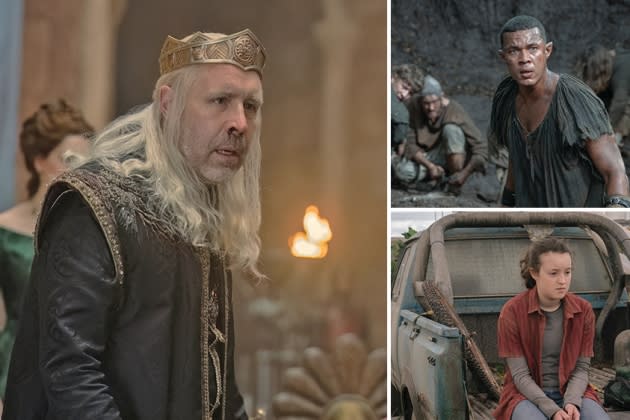How ‘The Last of Us,’ ‘House of the Dragon’ and ‘Rings of Power’ Composers Crafted Scores Fans Would Enjoy
- Oops!Something went wrong.Please try again later.
- Oops!Something went wrong.Please try again later.
- Oops!Something went wrong.Please try again later.
- Oops!Something went wrong.Please try again later.
- Oops!Something went wrong.Please try again later.
- Oops!Something went wrong.Please try again later.

Fantasy show composers Gustavo Santaolalla (“The Last of Us”), Bear McCreary (“The Lord of the Rings: The Rings of Power”) and Ramin Djawadi (“House of the Dragon”) knew going in that their respective projects had built-in audiences — and that those fandoms should be kept in mind while creating their scores.
“The Last of Us” showrunners Neil Druckmann and Craig Mazin told Santaolalla that music needed to be “another character” for the HBO series adapted from the video game he previously scored. Rather than create new themes, Santaolalla organically transitioned the music to TV. The South American instrument called “the ronroco,” which he used to write “The Last of Us” theme, was integral in keeping that connectivity for fans who had experienced Joel (Pedro Pascal) and Ellie’s (Bella Ramsay) journey before.
More from Variety
'Andor' Costume Designers Break Down Looks of Mon Mothma, Luthen Rael and Imperial Prisoners
Adam Scott Reflects on 'Unique' Opportunity to Return to 'Party Down': 'It Was Unfinished Business'
Santaolalla also brought back “All Gone,” “The Path” and other fan-favorite tracks for “The Last of Us” TV series. “They all became iconic. I made sure to readapt them for the series,” he says. “Fans of the video game have such devotion to the music. And it connected me to 12-15-year-old kids who didn’t know anything about me beforehand,” he adds.
Similarly, Djawadi’s work on the cultural juggernaut “Game of Thrones” over eight seasons is well known among its many fans. “House of the Dragon,” a prequel to that earlier series and also based on work by author George R.R. Martin, is loaded with references to its many memorable motifs, and that was very much by design.
“We sat down and discussed how many of the old themes we wanted to bring back,” he says, estimating that “90% of it is probably new music. But it’s a family [the Targaryens] that we’re already familiar with, so it had to be sonically connected. The cello, for me, was still the main instrument, and just a core sound of the show. And so, I felt like that should be untouched.”
The main “Game of Thrones” theme song was also used for “House of the Dragon,” as it was designed to connect the two shows and give them an overarching theme.
McCreary also aimed for a sense of continuity. The composer knew audiences would be well acquainted with Howard Shore’s multi-Oscar winning work on “The Lord of the Rings” trilogy, but he also considered viewers of the Amazon series who weren’t.
“I am writing for an audience that will watch this far in the future when all of this is in the rearview mirror, and they’ll say, ‘Hey, let’s watch the live-action Tolkien adaptations in narrative order,” says McCreary. “Continuity is what I really wanted to preserve. I wanted to create music that would fit alongside and flow into what Howard Shore did and in some cases even fly against it, particularly for societies that we see in ‘The Rings of Power’ that don’t exist anymore in the Peter Jackson films.”
Best of Variety
Sign up for Variety’s Newsletter. For the latest news, follow us on Facebook, Twitter, and Instagram.
